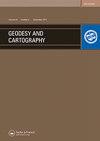GEODETIC EVIDENCE FOR POST-SEISMIC DEFORMATIONS FOLLOWING THE 2014 NORTH AEGEAN MW 6.9 EARTHQUAKE
IF 2.1
Q3 REMOTE SENSING
引用次数: 0
Abstract
The 2014 North Aegean Sea earthquake was a strong (Mw 6.9) event that caused significant crustal deformations. In the present study we investigate the long-term impact of the earthquake on the kinematics of the North Aegean Trough (NAT). For this purpose, we analyzed GPS observations collected from May 2010 to April 2022 at five permanent GPS reference stations. Two of these stations are located close to the epicenter(s) on the Islands of Lemnos and Samothrace. We processed the data using the Precise Point Positioning (PPP) technique. The analysis of the obtained coordinate time-series revealed a post-seismic deformation (PSD) period lasting for more than two years leading to cumulative 2D post-seismic displacement of 22 mm and 27 mm for Samothrace and Lemnos, respectively. The magnitudes of these post-seismic slip vectors correspond to 23% and 49% of the co-seismic vectors at Samothrace and Lemnos, respectively. The long-term analysis showed that after the end of the PSD period the stations are characterized by stable velocities that are noticeably different compared to the velocities prior to the event. We observed a change in the velocity in the order of 2 mm/yr for both Samothrace and Lemnos. It is the first time that PSD and velocity changes have been reported for the 2014 North Aegean Sea earthquake shedding light on the characteristics and the impact of this important earthquake on the kinematics of NAT.2014 年北爱琴海 6.9 级地震后震后变形的大地测量证据
2014 年北爱琴海地震是一次强震(震级 6.9 级),造成了严重的地壳变形。在本研究中,我们调查了地震对北爱琴海海槽(NAT)运动学的长期影响。为此,我们分析了 2010 年 5 月至 2022 年 4 月期间在五个永久性 GPS 基准站收集到的 GPS 观测数据。其中两个站点位于震中附近的莱姆诺斯岛和萨莫色雷斯岛。我们使用精确点定位(PPP)技术处理数据。对所获坐标时间序列的分析表明,震后变形(PSD)期持续了两年多,导致萨莫色雷斯岛和莱姆诺斯岛的二维震后累计位移分别为 22 毫米和 27 毫米。这些震后滑移矢量的大小分别相当于萨莫色雷斯和莱姆诺斯共震矢量的 23% 和 49%。长期分析表明,PSD 期结束后,各站的速度趋于稳定,与地震前的速度相比有明显不同。我们观察到,萨摩色雷斯和莱姆诺斯的流速变化都在 2 毫米/年左右。这是首次报告 2014 年北爱琴海地震的 PSD 和速度变化,揭示了这一重要地震的特征及其对 NAT 运动学的影响。
本文章由计算机程序翻译,如有差异,请以英文原文为准。
求助全文
约1分钟内获得全文
求助全文
来源期刊

Geodesy and Cartography
REMOTE SENSING-
CiteScore
1.50
自引率
0.00%
发文量
0
审稿时长
15 weeks
期刊介绍:
THE JOURNAL IS DESIGNED FOR PUBLISHING PAPERS CONCERNING THE FOLLOWING FIELDS OF RESEARCH: •study, establishment and improvement of the geodesy and mapping technologies, •establishing and improving the geodetic networks, •theoretical and practical principles of developing standards for geodetic measurements, •mathematical treatment of the geodetic and photogrammetric measurements, •controlling and application of the permanent GPS stations, •study and measurements of Earth’s figure and parameters of the gravity field, •study and development the geoid models,
 求助内容:
求助内容: 应助结果提醒方式:
应助结果提醒方式:


